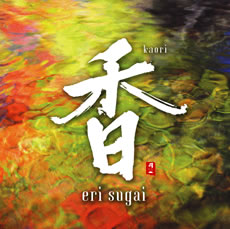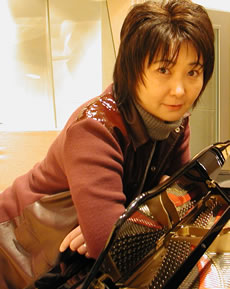
Image © Pacific Moon (Japan) 2004
 Eri Sugai
Eri Sugai
Image © Halftone Music 2004
More Eri Sugai
Mai | Air
|
|
(25 July 2004) It is unbelievable how poorly the modern Asian music is known in other parts of the world, especially in Europe. European and American crossover artists such as Enya and Adiemus sell millions of their albums fairly easily, but unfortunately, they leave also many smaller but at least equally wonderful artists behind. Review. One of these great artists almost totally unknown outside Asia is Japanese Eri Sugai, whose stunning debut album Mai (review) was released in 2000 in Japan and in 2001 in several other territories. Additionally, Eri Sugai performed on Air by the ensemble Stella Mirus (review), who are planning a new release soon. Eri Sugai's new album is entitled Kaori (Pacific Moon (Japan) CHCB-10051 (PMR-0051), 2004). Eri Sugai's music will most certainly appeal to fans of Adiemus and Miriam Stockley to name a few. Musically, Kaori is very carefully made, a great wholeness, which kind of continues from Sugai's debut album Mai. The features of Asian and Japanese music cultures are still strongly featured in the music; in addition to the invented phonetic lyrics, Eri Sugai has successfully used e.g. Asian gamelan instruments, shamisen, sitar, Chinese flutes, and lots of percussion, and she literally makes the music to tell stories. Stories from imagined voyages to Asia, stories from the Okinawa area in a modernised folk song "Teinsagu Nu Hana" which also features some African-sounding, Adiemus-like vocals, and so on. Even the 1300-year-old well-known composition "Etenraku" has been splendidly modernised, so that the old and the new traditions go smoothly hand in hand on that song. Although those Asian flavours are still strongly present in Eri's music, that feature is not making the music to become numb or boring. Also, much criticism has been expressed about new age or crossover music, insisting that the artists of those genres are producing samey music from album to another, this is not the case with Eri Sugai at all. Eri Sugai's music is indeed diverse and very enjoyable with all kinds of flavours and rich ideas, but that doesn't make her music too diverse either! Both melodically and rhythmically, Kaori is a splendidly made album, featuring dynamic pieces such as the lilting "Breath of Earth" as well as the sequel to "Song of Birth" (from Mai), entitled "Kunino Sazuchi," and very melodic, almost angelic and heavenly piece "Eternal Prayer" which features baroque-like chorus setting. Another piece which deserves a special mention is "Silence," featuring the idea of "shishi odoshi," a bamboo water piece in the Japanese tea garden which gently plops when releasing the water from its hollow and hitting the rock beneath it. Eri Sugai's idea of using sounds like this in her music is indeed an unique and a wonderful one, and the idea is resulted as a delicate, unwinding piece. Each and every track on the album is an important part of a big musical rainbow, a rainbow which wonderfully contains numerous and numerous colours. And, the more one listens this album, the more colours, different hues and dimensions can be found. The musical experience is so unforgettable that the more one listens the album, the more difficult it is to place the pieces into any ranking. This property is one of the features, which every musician and songwriter should keep always in mind when making music. Interview. MD: What did you have in mind for Kaori? Eri Sugai: Like a fresh fragrance. Arising from the album like fresh wind weaving out of the bamboo grove. You can hear the quiet whispering of the spirits that say they dwell in the hollows of the bamboos. Just like the layers of bamboo leaves are so refreshing and cool, the layers of brightly hued signing voices become also so crystalline clear. And how does the album develop? From the magestic voyage in the opening it goes on to the ancient story song of the second, and in the third, transcending the ethnic instruments gamelan and the digiridoo. I use my voice to weave the aesthetic sounds of harmony. As instruments of various nations dance in sound, my voice throbs and dances to the waves of these sounds, and runs between these waves and weaves a tapestry of its own. How about some more examples? We find transitions of nature and songs of praises to the earth. There are no boundaries of lands to the words I create yet there is such a feeling of nostalgia for ancient Japan in the rich resonance of these sounds. You can feel the landscapes, the images of the Japanese kokoro--the psyche--in these. But5 I don't stop at Japan or Asia. Instead I attempt to integrate Western sounds. How do you create the music? Painstakingly. I record the voice in many layers before placing the main vocal in this chorus. Finally I construct my world of sounds and weave the ancient beauty of Japan into the tapestry. You'll find bright hues of sounds dedicated to the heavens in festivals and ceremonies in the sound, and an unlimited expression of the human voice and a gift delivered from the heavenly skies. Please compare it to Mai. The album contains the hearfelt desire not only to listen to the voice but to the fragrance of the music. Because I have had many journeys to so many lands, I know now how my own country and other countries can coexist in harmony and in the same way that I love this island of the four seasons, my own nostalgia for this ancient land pulses strongly in each piece of this album. One must only hope, that already in the near future the word of the unique and wonderful music made by Asian artists such as Eri Sugai could spread also outside Asia, and that this could increase the recognition to worldwide level. This music really deserves the worldwide attention, both in terms of the album sales as well as in terms of live performances. In summary, Eri Sugai's album Kaori is indeed a real ear-charmer, and a must-listen!--Suvi Kaikkonen in Oulu, Finland and Russ Elliot in New York 
|






